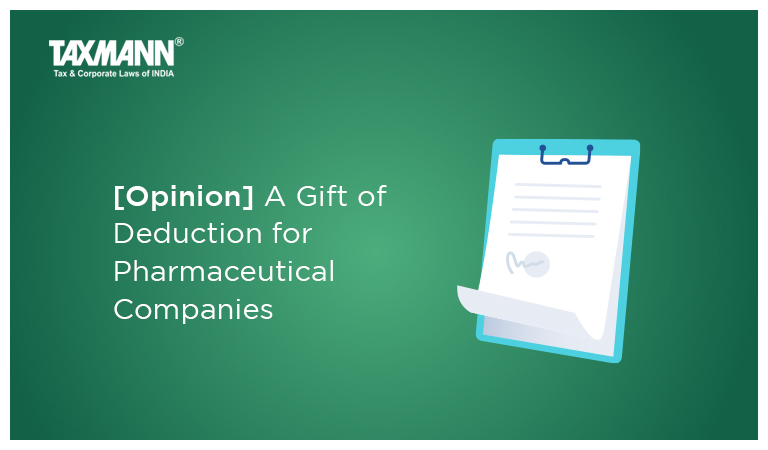[Opinion] A Gift of Deduction for Pharmaceutical Companies
- News|Blog|Income Tax|
- 2 Min Read
- By Taxmann
- |
- Last Updated on 12 September, 2022

Nidhi Pathak & Aditya Vyas – [2022] 142 taxmann.com 173 (Article)
This article focuses on the judicial trend, where freebies given by pharmaceutical companies were allowed as a deduction under section 37(1) of the Income-tax Act, 1961 (Tax Act) for all the expenditures which fall outside the ambit of Section 30 to 36 of the Tax Act that are incurred wholly or exclusively for business or professional purposes subject to two exceptions viz. any expenditure that is prohibited by law or any expenditure which falls under the umbrella of section 135 of the Tax Act as an expenditure incurred for any corporate social responsibility. In the light of the recent ongoing case of Federation of Medical and Sales Representatives Association of India v. Union of India popularly known as the “Dolo Freebies Case” where the Central Board of Direct Taxes (CBDT) have alleged that the Pharma Company manufacturing Dolo tablets have distributed freebies worth Rs. 1000 Crore to doctors for influencing the prescription of Dolo 650mg, has created a widespread concern amongst the pharmaceutical entities in India. Considering that majority of the pharmaceutical entities provides various objects and samples to the doctors for the purpose of advertisement and the creation of brand reminders, this article will focus on the circumstances along with the conditions where the courts, specifically the Income Tax Appellate Tribunal (ITAT) have allowed deductions for objects given by pharmaceutical companies to medical practitioners.
The Legal Outlook
CBDT Circular No. 5 of 2012 (the Circular) forbids medical professionals (and their professional associates) from accepting any form of incentives or “freebies”, including but not limited to, gifts, freebies, travel facility, hospitality, case, or monetary grant, from the pharmaceutical and allied health sector industries. In addition, it was made clear that any costs incurred in providing the aforementioned freebies or those similar to them would be considered illegal expenses in violation of Regulation 6.8.1 of the Indian Medical Council (Professional Conduct, Etiquette and Ethics) Regulations, 2002 (the Regulations), as explained in the Tax Act’s section 37(1) explanatory notes. Businesses in the pharmaceutical and allied health industries, as well as any other assesses that have supplied freebies and written them off as business expenses, will have those amounts disallowed as deductions.
Earlier there was a confusion as to whether the Circular will be applicable to pharmaceutical companies or not but after the judgment of Apex Laboratories (P.) Ltd. v. Dy. CIT LTU it was made clear that the same would apply to pharmaceutical companies. In the case of Apex Laboratories (P) Ltd. despite the Hon’ble Supreme Court making the Circular applicable on pharmaceutical companies and holding the judgment against the assessee, highlighted on the essence where the freebies or gifts have the potential to influence or manipulate the prescription of a medical practitioner which can be incentivize the doctor’s intention to avail more luxurious and expensive freebies offered by the pharmaceutical companies.
Click Here To Read The Full Article
Disclaimer: The content/information published on the website is only for general information of the user and shall not be construed as legal advice. While the Taxmann has exercised reasonable efforts to ensure the veracity of information/content published, Taxmann shall be under no liability in any manner whatsoever for incorrect information, if any.

Taxmann Publications has a dedicated in-house Research & Editorial Team. This team consists of a team of Chartered Accountants, Company Secretaries, and Lawyers. This team works under the guidance and supervision of editor-in-chief Mr Rakesh Bhargava.
The Research and Editorial Team is responsible for developing reliable and accurate content for the readers. The team follows the six-sigma approach to achieve the benchmark of zero error in its publications and research platforms. The team ensures that the following publication guidelines are thoroughly followed while developing the content:
- The statutory material is obtained only from the authorized and reliable sources
- All the latest developments in the judicial and legislative fields are covered
- Prepare the analytical write-ups on current, controversial, and important issues to help the readers to understand the concept and its implications
- Every content published by Taxmann is complete, accurate and lucid
- All evidence-based statements are supported with proper reference to Section, Circular No., Notification No. or citations
- The golden rules of grammar, style and consistency are thoroughly followed
- Font and size that’s easy to read and remain consistent across all imprint and digital publications are applied



 CA | CS | CMA
CA | CS | CMA
